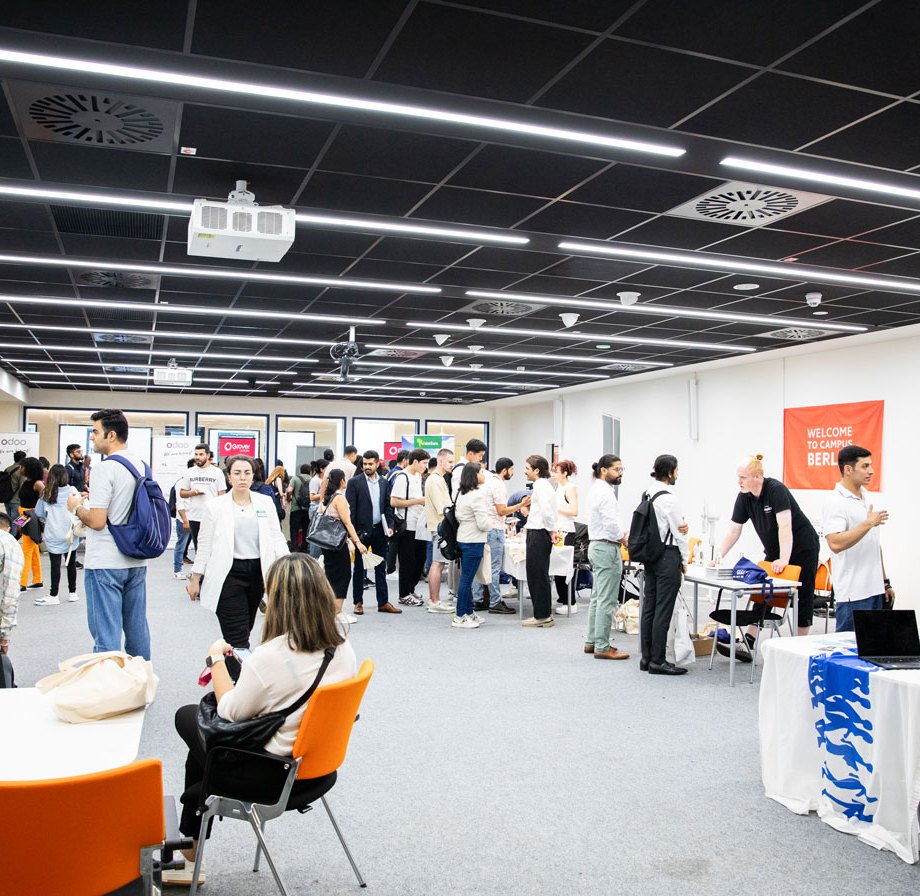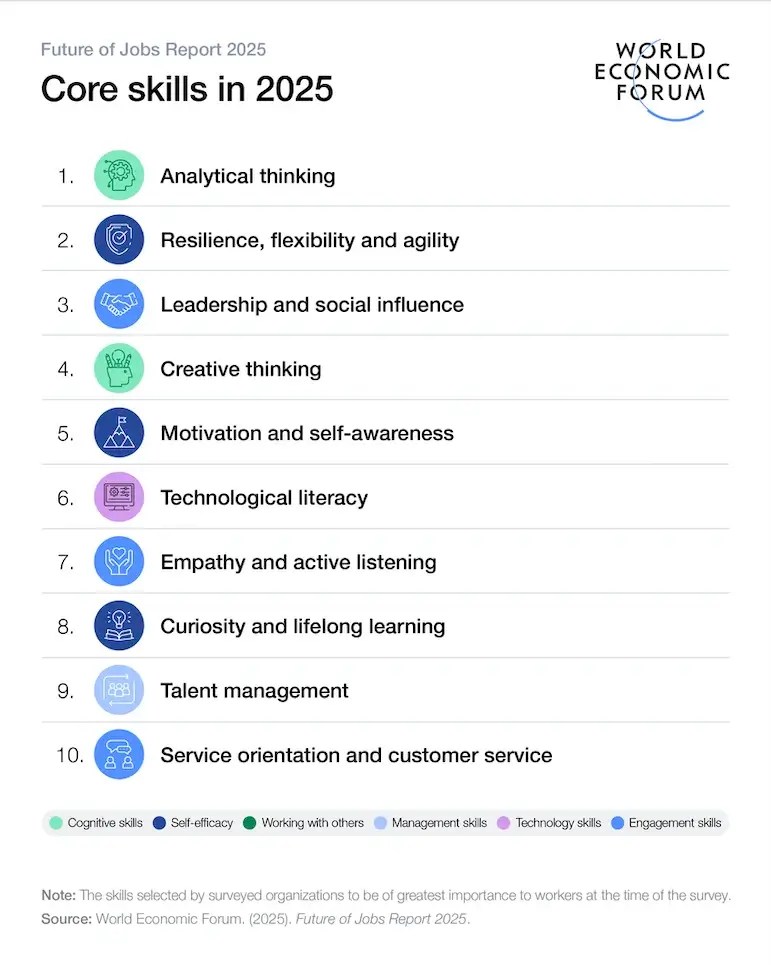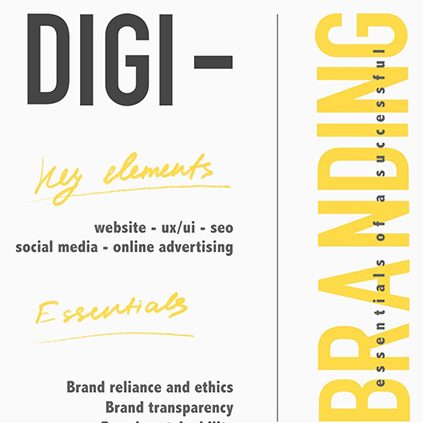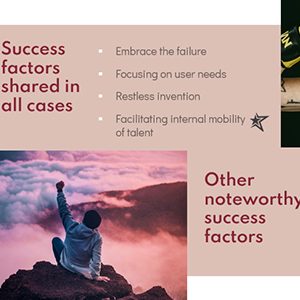M.Sc. Digital Transformations
Elevate your career with our Master's programme in Digital Transformations at UE Germany.
Apply Now
Nurturing future leaders in digital innovation and strategy
This Master's programme is aimed at students seeking a degree in a business, social, or humanities-related field.

Curriculum
Digital Transformations
Video by Ivan Bogomolov
Key facts MSc Digital Transformations
Check out our Location
Take a look at our Innovation Hub (Berlin-Potsdam).
Immerse yourself in a city full of culture, diversity, and opportunities!
Do you want to see our campus but aren’t around? Check out our Virtual Campus Tour.
Admission Requirements
Here are some things you will require for your application at the UE:
- Completed admission form
- Transcript & language proficiency
- CV & Copy of passport
Fees
- From € 1,046 per month
*Speak to one of our student advisors about available savings and financial support.
Got questions about financing? Check out our fees!

Semesters & Credits
- Standard Track (120 ECTS), Fast Track (60 or 90 ECTS) (2,3 or 4 semesters)
- Teaching language: English
- Classes are typically scheduled between Wednesdays & Saturdays
Explore our Innovation Hub, fostering a vibrant community enhancing both academic and social experiences for students.

Spotlight Module: "Digital Transformations"
Digital transformation processes change cultural, communicative, and societal interactions through various media, involving both digitised and born-digital materials. These processes merge traditional social science methods with computing tools like data visualisation, information retrieval, data mining, statistics, text mining, digital publishing, and digital memory.
This introductory seminar covers the fundamentals of artificial intelligence, computer languages, robotics, and cognitive psychology related to information acquisition, storage, and symbolic representation. It begins with different information models and techniques from various disciplines, including machine learning, symbolic manipulation, algorithms, and recent developments like Chat GPT and CGI applications.
Key concepts include embodiment, entanglement, and immersion in Digital Cultural Heritage, the Internet of Things, new media, and creating digital worlds (hybrid, mixed, augmented, and extended realities). The seminar spans the history and epistemology of digital media in the humanities to implementing knowledge representation across various media, exploring how AI and neural networks have evolved into today's Metaverse and other applications.

Career Opportunities for Graduates in Digital Transformations
This seamless integration of theoretical knowledge and practical skills ensures that our graduates are ready to make a lasting impact in their chosen professions.
Admission Requirements
Our applicants have a strong interest in and a basic understanding of different virtual and digital environments in different media and modalities (e.g. image, sound) and basic ideas of so-called computation models as well as programming languages and are familiar with current AI applications in design processes, i.e. from text to image, text to video, 3D, audio, etc.
The following applicants can be admitted to the programme:
– Applicants with humanities degrees, e.g., in (comparative) cultural studies, philosophy, sociology, art history, media studies, linguistics, literary studies, psychology, etc.
– Applicants with degrees in art and design-related subjects, e.g., fine arts, architecture or design, e.g., communication, graphics, media, industrial, etc.
– Applicants with degrees in business-related subjects, e.g., economics, marketing, business administration, etc.

Prioritising Human-Centric Digital Transformation
Recommendation for the Programme: Content on human-centred design, digital ethics, and inclusive technology helps graduates develop systems that prioritise user needs, accessibility, and ethical considerations.
Key Insight from the Worls Economic Forum Report: User-centric approaches, like UX design and ethical AI, are critical for successful digital transformation.
Source: World Economic Forum, The Future of Jobs Report 2025
Inspiring Creativity: Student Projects Showcase
Prof. Dr. phil. habil. Martin Thiering
Contact us today
Digital transformations are processes that encompass the integration of digital technologies into nearly all aspects of human life, including culture, economy, education, healthcare, governance, and more. At its core, digital transformations involve the utilization of digital tools, applications, and technologies, but they extend far beyond mere adoption of new devices and software: they signify fundamental changes in how individuals and societies work, communicate, interact, and how organizations create value.
They represent both challenges and opportunities for businesses and cultural institutions, including museums, archives, and universities. This is particularly relevant in many economies where the production of physical goods traditionally holds significant importance, such as in Germany.
The curriculum focuses on areas such as design thinking, conceptualization, strategy, the development of animated visual projects, information design, and storytelling. By integrating the latest design software and AI applications, students’ creativity is fostered, providing them with valuable insights into the media and advertising industry.
This includes, for example, the following positions:
- Museum and archival studies, digital curators
- Data scientists, digital archivists, and data analysts (digitization of texts and information)
- Publishing and online media, university and non-university research institutions
- Text and language analysts, online publishers
- Data artists and big data analysts
- Customer experience managers
- Cloud architects
- Developers and users of artificial intelligence
- Environmental technicians
- E-commerce merchants
- Process managers and system architects for digital health
- Robotic process automation (RPA) consultants/developers
The following applicants can be admitted to the programme:
- Applicants with humanities degrees, e.g., in (comparative) cultural studies, philosophy, sociology, art history, media studies, linguistics, literary studies, psychology, etc.
- Applicants with degrees in art and design-related subjects, e.g., fine arts, architecture or design, e.g., communication, graphics, media, industrial, etc.
- Applicants with degrees in business-related subjects, e.g., economics, marketing, business administration, etc












